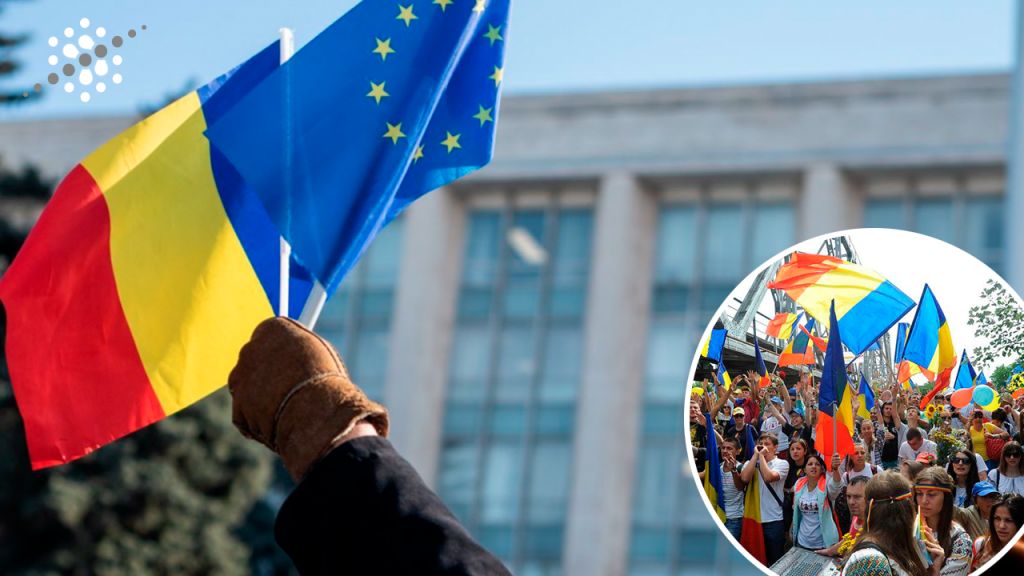ACTION PLAN FOR IMPLEMENTING EU CONDITIONS AS A NEW STEP ON THE WAY TO THE EUROPEAN FUTURE OF MOLDOVA
After Russia’s full-scale invasion of Ukraine, on February 28, 2022, the Ukrainian authorities submitted an application to join the European Union under the accelerated procedure. Realizing the scale of the consequences of Russian aggression and not wanting to be part of the so-called “isolated world” subject to Russian influence, Georgia and Moldova decided to act in unison with Ukraine and, following it, submitted their applications for EU candidate status on March 3. In the context of the tragic events taking place in Ukraine and the changing dynamics of geopolitical transformations, issues of security and preservation of the future development opportunities of these states in a democratic world came to the fore, primarily from a strategic point of view. This can be achieved only through the implementation of the only viable project – the entry of Ukraine,
Russia’s full-scale war against Ukraine changed not only the architecture of international security and the configuration of forces in Europe, but also forced a rethinking of the European idea of expansion and cooperation in relation to Ukraine, Moldova and Georgia. And it is not only a matter of the political background of this decision and the possibility of connecting the enlargement policy with the transformation of the EU itself, the reasonableness and pragmatism of such an approach is outlined in the strategic orientation of the future development of these states.
Moldova’s acquisition of EU candidate status was a historic, turning point that marked the beginning of the transition from the neighborhood policy to the enlargement policy. This presupposes the consolidation of the European model of development and its foreign policy future as an EU member state for the Republic of Moldova. A long path of reformation and transformation lies ahead, the beginning of which will be the fulfillment of Moldova’s nine conditions put forward by the European Commission for the continuation of the European integration process.
Based on these conditions, the authorities immediately began to develop an action plan for their implementation with the distribution of responsibilities assigned to the corresponding institutional structures and the establishment of deadlines for the implementation of the set tasks. As part of this process, consultations with representatives of civil society are provided for their introduction of proposals, corrections, exchange of opinions and coordination of positions on these actions. This undoubtedly contributes to the expansion of civil society’s ability to influence the decision-making process, promotes the development of dialogue between government structures and the third sector, increases the level of transparency in the development and implementation of policies, changes in the regulatory and legal framework, as well as the coherence and coordination of actions on the way to the European future .
Since the EU as a regulatory and legal integration formation requires special attention of candidate countries for joining the EU, the enlargement policy itself is largely determined by regulatory and legal factors, the ability to implement them and their practical implementation. They are indicators of the state’s readiness for EU integration, as they reflect the extent to which the country’s legislation, standards, and values comply with EU norms and rules.
Of the nine conditions put forward by the EU, four of them concern justice – one of the most important and, at the same time, extremely vulnerable spheres that are difficult to reform in the Republic of Moldova. The effective functioning of justice was and remains the most important priority for the development of a democratic society. Throughout virtually the entire period of reforms, various approaches of a segmental and complex nature were used as applied to the justice system, various methods and methods alternated, however, it was not possible to achieve any radical changes. As before, the corruption component remains, which has a destructive effect on the integrity of the execution of their immediate duties by the subjects of the judicial system, legislative instability and inconsistency of judicial practice prevail. The Strategy for Ensuring Independence and Incorruptibility in the Justice Sector for 2021-2024, adopted by the authorities , has also been repeatedly criticized for not meeting the requirements of the legislative technique.
Therefore, one of the primary tasks of the draft Action Plan developed by the authorities for the implementation of the conditions put forward by the EU in the context of granting the Republic of Moldova the status of a candidate country for accession to the European Union is directed to the completion of the key steps of the comprehensive reform of the justice system that has been initiated and included in it established. In order to ensure their independence, integrity, efficiency, accountability and transparency, including through the effective use of asset verification and effective democratic oversight, it will be necessary to make certain changes to legislative initiatives. First of all, this will affect bringing the legal base in the field of judicial power into compliance with the new constitutional provisions adopted by Law No. 120 dated September 23, 2021, implementing the recommendations of the Venice Commission, making changes to the legal framework regarding the disciplinary responsibility of judges, increasing the potential and reforming the reception and evaluation commissions for the work of judges at the Supreme Council of Magistracy, as well as issues related to the declaration of assets, the creation of a mechanism for their verification along with tracking integrity of candidates at the stage of admission to the National Institute of Justice. Special attention will be paid to making changes to the Law on the Prosecutor’s Office to improve it in accordance with the recommendations of the Venice Commission of December 2021.
The plan envisages measures to eliminate deficiencies in the justice system identified by the OSCE and the Venice Commission . They presuppose the adoption of a revised draft of the Electoral Code, approved by the decision of the Central Electoral Commission, taking into account the recommendations made by the specified structures.
Fight against organized crimeit also became one of the conditions of the European Commission, which was included in the group of the block of legal issues. It is supposed to be strengthened with the help of detailed threat assessments, the introduction of a set of measures aimed at expanding cooperation with the EU and international regional partners, as well as improving the coordination of the activities of law enforcement agencies. The primary task in this regard is the search for optimal ways to link the strategy of the Republic of Moldova in the field of internal affairs with the vision of the EU to create an effective security system, ensure the security of network and information systems, combat cybercrime and ensure an effective system of its functioning, fight against organized crime, and exchange information on border security and employee training.
In light of the changing dynamics of regional security caused by the full-scale war of the Russian Federation against Ukraine, which caused the mass displacement of Ukrainian citizens, it seems important to note the measures concerning Ukrainian refugees provided for in the Action Plan of the Government of the Republic of Moldova. In particular, registration of cases of involvement of Ukrainian refugees in criminal activities, provision of analytical support, capacity building for risk analysis, strategic and operational analysis for better protection of refugees temporarily staying on the territory of the Republic of Moldova, in particular women and children.
Measures to observe human rights are a separate block of issues. In order to fulfill the conditions for strengthening the protection of human rights , in particular vulnerable groups, and strengthening obligations to strengthen gender equality and fight against violence against women, a number of actions of the Government aimed at adapting legislation to international European standards and the requirements of the European Commission have also been developed. This will affect the fight against discrimination in all sectors of social life, the strengthening of the institutional and functional potential of the Ombudsman, the fight against domestic violence in accordance with the Istanbul Convention, as well as the protection of children from sexual exploitation and sexual abuse in accordance with the Lanzarote Convention.
The other five blocks of conditions are also focused on the most problematic areas that inhibit the progressive development of the state, the implementation of reforms and their practical impact. The authorities of the Republic of Moldova have to fulfill their obligations to fight corruption at all levels . Since corruption had a systemic nature for a long period of time, the emphasis is on political corruption, its eradication in institutional structures and state institutions. Special attention will be paid to the importance of increasing the number of convictions for serious acts of corruption. A separate block passes conditions on de-oligarchization, elimination of the negative influence of financial groups in economic, political and public life. In this regard, an analysis of appropriate practices in other countries aimed at reducing the negative influence of persons with significant influence on the markets will be conducted with the aim of preparing an appropriate legal framework in this area.
The reform of local public administration and updating its strategy, as well as increasing the potential for reforms and providing quality public services, is a difficult task that requires close attention. It is assumed that the strategy will cover both central and local authorities, its implementation will lead to an increase in the number of employees, the attraction of professional personnel to public authorities and will allow the process of digital provision of public services to continue.
A set of measures is provided for the completion of the reform of state financial management , in particular, the procedure for identifying investment projects, expanding the scope of the existing state investment management system by including project proposals implemented at the expense of the state budget, as well as projects with external financing and extrabudgetary funds.
The list of conditions put forward by the European Commission includes an increase in the involvement of civil society in decision-making processes at all levels , which will affect ensuring the functioning of consultative platforms between authorities and representatives of civil society on a permanent basis, strengthening the financial stability of the third sector, and developing a program political document aimed at development of ego potential.
The Ministry of Foreign Affairs and European Integration held public consultations from July 20 to August 1, 2022on the discussion of the draft Action Plan for the implementation of the proposed conditions in the context of granting the Republic of Moldova the status of a candidate country for joining the European Union. During the specified period, 18 sets of proposals for the draft Action Plan were received (10 non-governmental organizations, 7 individuals, 1 government body). On August 1, the Ministry of Foreign Affairs and European Integration held an official discussion of this Plan, the issues that arose and the recommendations proposed by civil society representatives. The event was attended by representatives of the Center for Policy and Reforms, the National Confederation of Trade Unions of Moldova, the National Youth Council of Moldova, the Soros Foundation in Moldova, the Institute of European Policy and Reforms, as well as state bodies, participating in the development of the Action Plan project. The presented recommendations were tested by the National Commission for European Integration, as a result of which this plan was adopted by it on August 5 of the current year. according toaccording to the statement of the Deputy Prime Minister Nik Popescu, this was another step in the direction of joining the EU.
The developed list of measures within the framework of the Action Plan clearly demonstrates that their implementation will undoubtedly bring significant benefits to the entire society and will be the trajectory of movement that will lead to the modernization of the state and significant progress. This is important not only in the context of accession to the EU, but also from the point of view of potential opportunities for sustainable development of the state. There are quite a lot of problematic issues in the process of implementing this Plan, and all of them are exacerbated by limited time frames for their implementation, the weakness of individual institutional structures, and the limited number of professional personnel involved in this process.
Changes in any area are always accompanied by a certain discomfort, however, in the future, it will transform into a beneficial effect and will be felt by ordinary citizens. The status of the candidate does not presuppose the automatic start of the negotiation process on joining the EU. This will become possible only in case of practical implementation of the road map of reforms and concrete achievements in this direction. Subsequent negotiations will also require time and significant efforts on the part of the state and society. At this stage, the mobilization of citizens who voted for European integration is important, since the success of this process depends on the contribution of each individual citizen to the implementation of reforms. In this context, it seems appropriate to resort to the words of the President of the Republic of Moldova M.“This is not my project, the project of the Government or the Parliament – it is the project of our generation, it is your project, and its success depends on all of us. Moldova’s place in the European family”.
The issue of Transnistrian settlement remains a stumbling block on the way to the EU. In parallel with Europeanization, work on the reintegration of the state will be continued with the help of dialogue, diplomacy and negotiations. Some analysts believe that in the conditions when the Republic of Moldova has already received the status of a candidate country for joining the European Union, it is possible to talk about certain favorable opportunities for determining the means necessary for the Transnistrian settlement.
At the same time, the situation in the unrecognized Transnistrian region is far from the most favorable, provocative incidents in the field of security, occurring on its territory in the conditions of a full-scale war between Russia and Ukraine, cannot but cause fear. The optimal formula for a comprehensive, peaceful and lasting political settlement of the Transnistrian conflict based on the sovereignty and territorial integrity of the Republic of Moldova within its internationally recognized borders, as well as the withdrawal of Russian troops stationed there, has not yet been found. Unfortunately, there is no particular optimism in the advancement of this issue. Especially if we take into account the attitude of the authorities of the unrecognized PMR, who were extremely critical of Moldova’s application for EU membership, and in response to this step, Moldova once again demanded international recognition. He expressed dissatisfaction with the fact that this decision was made by the Moldovan sidewithout taking into account the opinion of the Transnistrian side , without holding preliminary consultations, while completely ignoring the discussion of this issue in the existing negotiation formats. In their opinion, this marks the end of the settlement process. It should be recalled that the authorities of the unrecognized Transnistria have repeatedly accused Chisinau of the crisis in the negotiation process, the dysfunction of the “5+2” format, the refusal of high-level meetings, the non-fulfillment of obligations under the “Berlin Plus” package, the strengthening of the blockade and restrictive measures against Transnistria.
According to the Transnistrian side, the application for joining the EU is a geopolitical decision that will lead to changes in international borders and spheres of influence in the regional space. If you follow this logic, it seems very strange that the actions of the Russian Federation in relation to Ukraine and the region are not considered by the unrecognized authorities of Transnistria in the same rhetoric. Of course, much will depend on the outcome of the war in Ukraine. A side effect of Ukraine’s victory may well be the collapse of the pro-Russian separatist regime in Tiraspol. Otherwise, the situation may get even worse, since Russia is not interested in Moldova joining the EU .If Moldova integrates into the EU without resolving the Transnistrian issue, the incentives for Russia’s support for this region will also weaken. Variants of the possible development of events can be different, they are difficult to calculate, only one thing is indisputable – the Transnistrian region should not become an obstacle for Moldova on the way to the European future.
Natalya STERKUL
Foreign Policy Association of the Republic of Moldova,
for “Ukrainian line”







